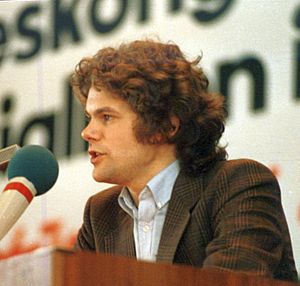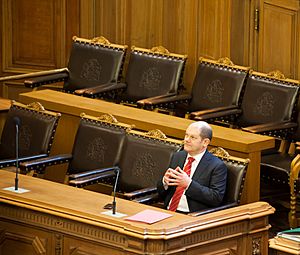Olaf Scholz facts for kids
Quick facts for kids
Olaf Scholz
|
|||||||||||||||||||||||||||||||||||||||||||||||||||||||||||||
|---|---|---|---|---|---|---|---|---|---|---|---|---|---|---|---|---|---|---|---|---|---|---|---|---|---|---|---|---|---|---|---|---|---|---|---|---|---|---|---|---|---|---|---|---|---|---|---|---|---|---|---|---|---|---|---|---|---|---|---|---|---|
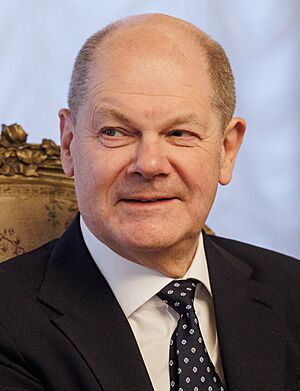
Scholz in 2024
|
|||||||||||||||||||||||||||||||||||||||||||||||||||||||||||||
| Chancellor of Germany | |||||||||||||||||||||||||||||||||||||||||||||||||||||||||||||
| Assumed office 8 December 2021 |
|||||||||||||||||||||||||||||||||||||||||||||||||||||||||||||
| President | Frank-Walter Steinmeier | ||||||||||||||||||||||||||||||||||||||||||||||||||||||||||||
| Vice Chancellor | Robert Habeck | ||||||||||||||||||||||||||||||||||||||||||||||||||||||||||||
| Preceded by | Angela Merkel | ||||||||||||||||||||||||||||||||||||||||||||||||||||||||||||
| Vice Chancellor of Germany | |||||||||||||||||||||||||||||||||||||||||||||||||||||||||||||
| In office 14 March 2018 – 8 December 2021 |
|||||||||||||||||||||||||||||||||||||||||||||||||||||||||||||
| Chancellor | Angela Merkel | ||||||||||||||||||||||||||||||||||||||||||||||||||||||||||||
| Preceded by | Sigmar Gabriel | ||||||||||||||||||||||||||||||||||||||||||||||||||||||||||||
| Succeeded by | Robert Habeck | ||||||||||||||||||||||||||||||||||||||||||||||||||||||||||||
| Minister of Finance | |||||||||||||||||||||||||||||||||||||||||||||||||||||||||||||
| In office 14 March 2018 – 8 December 2021 |
|||||||||||||||||||||||||||||||||||||||||||||||||||||||||||||
| Chancellor | Angela Merkel | ||||||||||||||||||||||||||||||||||||||||||||||||||||||||||||
| Preceded by | Peter Altmaier (acting) | ||||||||||||||||||||||||||||||||||||||||||||||||||||||||||||
| Succeeded by | Christian Lindner | ||||||||||||||||||||||||||||||||||||||||||||||||||||||||||||
| First Mayor of Hamburg | |||||||||||||||||||||||||||||||||||||||||||||||||||||||||||||
| In office 7 March 2011 – 13 March 2018 |
|||||||||||||||||||||||||||||||||||||||||||||||||||||||||||||
| Second Mayor | Dorothee Stapelfeldt Katharina Fegebank |
||||||||||||||||||||||||||||||||||||||||||||||||||||||||||||
| Preceded by | Christoph Ahlhaus | ||||||||||||||||||||||||||||||||||||||||||||||||||||||||||||
| Succeeded by | Peter Tschentscher | ||||||||||||||||||||||||||||||||||||||||||||||||||||||||||||
|
|||||||||||||||||||||||||||||||||||||||||||||||||||||||||||||
|
|||||||||||||||||||||||||||||||||||||||||||||||||||||||||||||
| Personal details | |||||||||||||||||||||||||||||||||||||||||||||||||||||||||||||
| Born | 14 June 1958 Osnabrück, West Germany |
||||||||||||||||||||||||||||||||||||||||||||||||||||||||||||
| Political party | Social Democratic (since 1975) |
||||||||||||||||||||||||||||||||||||||||||||||||||||||||||||
| Spouse |
Britta Ernst
(m. 1998) |
||||||||||||||||||||||||||||||||||||||||||||||||||||||||||||
| Residences | Old Market Square, Potsdam | ||||||||||||||||||||||||||||||||||||||||||||||||||||||||||||
| Alma mater | University of Hamburg | ||||||||||||||||||||||||||||||||||||||||||||||||||||||||||||
| Signature |  |
||||||||||||||||||||||||||||||||||||||||||||||||||||||||||||
Olaf Scholz ( born 14 June 1958) is a German politician who has been the chancellor of Germany since 2021. He previously served as Vice Chancellor in the fourth Merkel cabinet and as Federal Minister of Finance from 2018 to 2021. He was also First Mayor of Hamburg from 2011 to 2018, deputy leader of the SPD from 2009 to 2019, and Federal Minister of Labour and Social Affairs from 2007 to 2009.
On 16 December 2024, Scholz lost a vote of confidence and in the following snap election on 23 February 2025, his SPD lost to Friedrich Merz's CDU, placing third, behind the AfD, and scoring the worst result in post-war history.
Contents
Early life and education
Scholz was born on 14 June 1958, in Osnabrück, Lower Saxony, but grew up in Hamburg's Rahlstedt district. His parents worked in the textile industry. He has two younger brothers, Jens Scholz, an anesthesiologist and CEO of the University Medical Center Schleswig Holstein; and Ingo Scholz, a tech entrepreneur. Olaf Scholz attended the Bekassinenau elementary school in Oldenfelde but then switched to the Großlohering elementary school in Großlohe. After graduating from high school in 1977, he began studying law at the University of Hamburg in 1978 as part of a one-stage legal training course. He later found employment as a lawyer specialising in labour and employment law, working at the law firm Zimmermann, Scholz und Partner. Scholz joined the Social Democratic Party at the age of 17.
Scholz's family is traditionally Lutheran and he was baptized in the Evangelical Church in Germany; he holds largely secular views and left the Church in adulthood, but has called for appreciation of the country's Christian heritage and culture.
Career
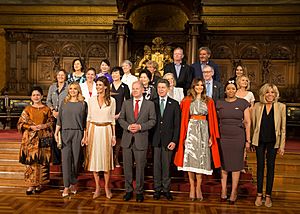
Scholz began his career as a lawyer specialising in labour and employment law. He became a member of the SPD in the 1970s and was a member of the Bundestag from 1998 to 2011. Scholz served in the Hamburg Government under First Mayor Ortwin Runde in 2001 and became General Secretary of the SPD in 2002, where he served alongside SPD leader and then-Chancellor Gerhard Schröder. He became his party's Chief Whip in the Bundestag, later entering the First Merkel Government in 2007 as Federal Minister for Labour and Social Affairs. After the SPD moved into the opposition following the 2009 election, Scholz returned to lead the SPD in Hamburg. He was then elected Deputy Leader of the SPD. He led his party to victory in the 2011 Hamburg state election and became First Mayor, a position he held until 2018.
After the Social Democratic Party entered the fourth Merkel government in 2018, Scholz was appointed as both Minister of Finance and Vice Chancellor of Germany. In 2020, he was nominated as the SPD's candidate for Chancellor of Germany for the 2021 federal election. The party won a plurality of seats in the Bundestag and formed a "traffic light coalition" with Alliance 90/The Greens and the Free Democratic Party. On 8 December 2021, Scholz was elected and sworn in as Chancellor by the Bundestag, succeeding Angela Merkel.
Chancellor of Germany (2021–2025)
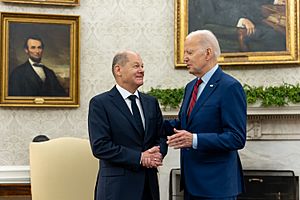
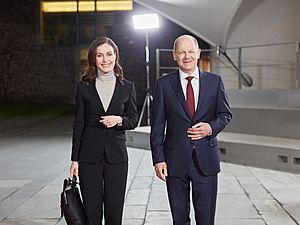
Scholz was elected Chancellor by the Bundestag on 8 December 2021, with 395 votes in favour and 303 against. His new government was appointed on the same day by President Frank-Walter Steinmeier. At 63 years, 177 days of age, Scholz is the oldest person to become Chancellor of Germany since Ludwig Erhard, who was 66 years, 255 days old when he assumed office on 17 October 1963.
In December 2021, Scholz travelled to Warsaw for talks with Polish Prime Minister Mateusz Morawiecki, where they discussed the Nord Stream 2 gas pipeline, which would bring Russian gas under the Baltic Sea to Germany and bypass Poland, and Poland's dispute with the European Union over the primacy of EU law. Scholz backed Poland's efforts to stop the flow of migrants seeking entry from Belarus.
Scholz extended into 2022 the suspension of the sale of weapons to Saudi Arabia. The decision was made to "no longer approve any export sales to countries as long as they are directly involved" in the Saudi Arabian-led intervention in Yemen. In September 2022, Scholz visited the United Arab Emirates, Qatar and Saudi Arabia, seeking to deepen ties with the Arab states of the Persian Gulf and find alternative sources of energy. Saudi Arabia's Crown Prince Mohammed bin Salman received Scholz in Jeddah. Scholz's government approved new arms export deals to Saudi Arabia, despite a ban imposed as a result of the Saudi war in Yemen.
Scholz called the US "Europe's closest and most important partner". Upon assuming the chancellorship in December 2021, he stated he would soon be meeting with President Joe Biden, saying: "It is now clear what binds us together."
On 22 February 2022, Scholz announced that Germany would be halting its approval of the Nord Stream 2 pipeline in response to Russia's recognition of two self-declared separatist republics within Ukraine. Scholz spoke against allowing the EU to cut Russia off from the SWIFT global interbank payment system.
In an emergency meeting of the Bundestag on 27 February, Scholz made the Zeitenwende speech, announcing a complete reversal of German military and foreign policy, including the commencement of weapons shipments to Ukraine and a 100 billion euro increase in Germany's defense budget. One reporter called it a path to "an emergency military modernisation, defence spending, energy independence from Russia, lethal assistance for Ukraine and EU financing for weaponry". However, in a press conference on 19 April Scholz spoke about slowing Germany's provision of weaponry to Ukraine, which was seen as reducing the scale of the policy change.
In June 2022, Scholz said that his government remains committed to phasing out nuclear power despite rising energy prices and Germany's dependence on energy imports from Russia. Former Chancellor Angela Merkel committed Germany to a nuclear power phase-out after the Fukushima nuclear disaster.
During the Israel–Hamas war, he authorized substantial German military and medical aid to Israel, and denounced the actions of Hamas and other Palestinian militant groups.
Scholz was elected to the 21st Bundestag by winning his constituency through the first vote in the 2025 German federal election. He has said that he intends to take up his mandate.
Other activities
International organizations
- European Bank for Reconstruction and Development (EBRD), ex-officio member of the board of governors (2018–2021)
- European Investment Bank (EIB), ex-officio member of the board of governors (2018–2021)
- European Stability Mechanism, member of the board of governors (2018–2021)
- Asian Infrastructure Investment Bank (AIIB), ex-officio member of the board of governors (2018–2021)
- International Monetary Fund (IMF), ex-officio alternate member of the board of governors (2018–2021)
Corporate boards
- KfW, ex-officio member of the Board of Supervisory Directors (2018–2021)
- RAG-Stiftung, ex-officio member of the board of trustees (2018–2021)
- HafenCity Hamburg GmbH, ex-officio chairman of the supervisory board (−2018)
Non-profits
- Lebendige Stadt Foundation , member of the board of trustees (2009–2021)
- Deutsche Nationalstiftung , member of the Senate
- Friedrich Ebert Foundation (FES), member
- German Council on Foreign Relations (DGAP), chairman of the Task Force on International Aviation Policy
Personal life
Olaf Scholz is married to fellow SPD politician Britta Ernst. The couple lived in Hamburg's Altona district before moving to Potsdam in 2018.
Scholz was raised in the Protestant Church in Germany and later left it. At his inauguration as chancellor in 2021, Scholz took the oath of office without a reference to God (the second chancellor to do so after Gerhard Schröder). He is the first chancellor of the Federal Republic of Germany who is not a member of a church.
On 4 September 2023, Scholz announced that he would be wearing an eyepatch following a jogging accident.
Images for kids
-
Scholz (SPD), Angela Merkel (CDU) and Horst Seehofer (CSU) presenting the 2018 coalition agreement for Germany's fourth Merkel cabinet
-
Scholz and US Secretary of the Treasury Mnuchin in 2018
-
Scholz with Brazilian President Luiz Inácio Lula da Silva in Brasília, Brazil on 30 January 2023
-
Scholz with Indian Prime Minister Narendra Modi in New Delhi, India on 25 February 2023
-
Scholz with Israeli President Isaac Herzog in Tel Aviv, 17 October 2023
-
Scholz and Macron visit Kyiv on 16 June 2022
-
Scholz and Polish Prime Minister Morawiecki in 2021
-
Scholz and Putin in Moscow on 15 February 2022
See also
 In Spanish: Olaf Scholz para niños
In Spanish: Olaf Scholz para niños


